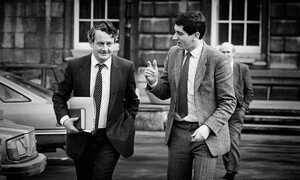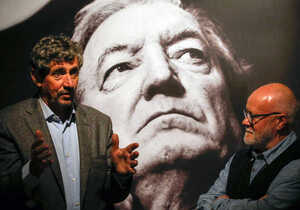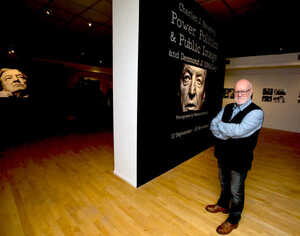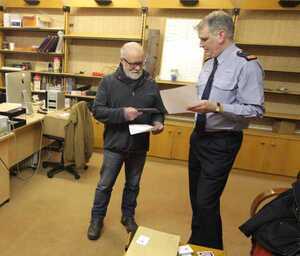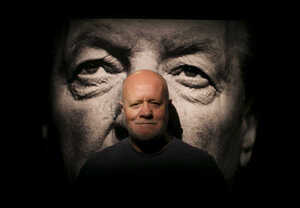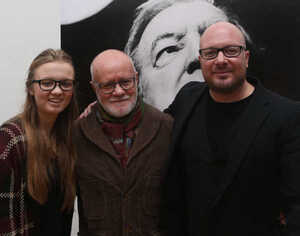 Eamonn Farrell at the Photocall Ireland agency in Dublin today
Eamonn Farrell at the Photocall Ireland agency in Dublin today
Further to this.
Eamonn Farrell, of Photocall Ireland went on RTÉ Radio One’s Today with Sean O’Rourke this morning to discuss the recent Garda seizure of photos from his agency of Irish Water protests.
They were joined by retired Garda Detective Chief Superintendent John O’Brien.
Grab a strong tay.
Sean O’Rourke: “The independence of photographers is being threatened by Garda demands to hand over videos and photographs of protests and demonstrations. That’s the strong view of the photographer and editor of Photocall Ireland Eamonn Farrell… Eamon , you’re a very experienced photographer, you’ve I think, your experience goes back as far as the riots outside the British Embassy in the early 80s, the H-Block riots, what’s been happening in your offices lately?”
Eamonn Farrell: “Well, over the last couple of years there’s been a change, as far as I’m concerned, in the attitude of the guards insofar as we have had several demands made to have access to our digital material, okay? And on the first two occasions and on the last occasions we refused to do this, pointing out to the guards the reasons for it, unless a warrant was produced. On the first two occasions no warrant was produced and nothing happened, on this occasion they came with a warrant and they demanded that material our photographer had taken at a particular event outside the Department of Justice would be produced to them.”
O’Rourke: “Was that a protest a regular protest?”
Farrell: “It was a protest outise the Department of Justice which will be in court in a couple of weeks time so actually I can’t speak too much about the actual detail of it.”
O’Rourke: “In your experience is this a totally new development then?”
Farrell: “It’s a new development for us but I believe and I am told, and how true it is I can’t vouch for myself, that it has been going on for quite a while but because the Gardai knew that we were very reluctant to give over material they went to other people in the first instance and got that material from other people who didn’t demand warrants.”
O’Rourke: “And for instance the Love Ulster March in Dublin that was a big event which turned violent, were you approached on that occasion?”
Farrell: “We were approached in relation to that one and we were approached in relation to the one in relation to the Queen’s visit and on this last one which was a very very small protest involving maybe 5 people and there were 5 Gardai present and as the NUJ said in its statement yesterday there are recording cameras outside the Department of Justice so they would have evidence there themselves.”
O’Rourke: “John O’Brien, what justification is there for this move by the Gardai?”
John O’Brien: “Well firstly let me say that I would empathise with Eamonn in terms of any, you know, danger to himself as he would see it and any personal risks which would arise from it. But the key question which arises is, is material gathered in the public space privileged material, you know, is it something that by definition should not be disclosed or is the property of, I mean I’m aware that from the commercial part of this that Eamonn and his company will sell his material on broadcasters like RTE or the media, so in essence, there’s nothing terribly precious about the material, it’s different from somebody who is a pencil journalist or someone who is taking you know, an editorial line, the image exists anyway, but you know, there are three kinds of principles which inform this thing which happens within the context which I would call the rule of law.
The first thing is legality, is what the guards are doing, is is it legal and the short answer is yes, it is it is legal. The other one is proportionality and necessity, you know, is it over the top to do it this way, eh, and excuse me, it meets both of those tests so there’s no real issue in respect of that, ias a matter of fact there would be an obligation and there is an obligation in court to produce the best evidence which means the original evidence. Now I know Eamonn is making the point, and I’ve read his article, very carefully and it’s a well balanced article, and I think his concerns are real, but I think maybe and no disrespect, he’s probably being a little bit precious in terms of this particular category, it’s not an assault on journalistic privilege… this is material which is available, for example, this morning, in relation to the incident, can someone say that there’s a real point of principle that CCTV footage of this…”
O’Rourke: “Ah, that’s an entirely different thing.”
O’Brien: “No it’s not, because somebody owns that information.”
Farrell: “Can I say, John, that we are not walking talking machines that we cover these events and record the visual images from the point of view of being active journalists, our job is to record what we see and by the way we do edit our material and the material that the guards were looking for was not the material we had already put up on our own website and issued to the media, it was the material we had decided not to make public, not to put in the public domain because that material can be misinterpreted, the material we put out is the the material we had edited and were happy that from a journalistic point of view is a fair reflection of what happened. The position now is that the guards are now in possession of material that we don’t know does reflect what happened, does it misinterpret what happened…”
O’Rourke: “But sure that’s the next step, you might have to go into court and give evidence about what happened.”
Farrell: “Absolutely, but there’s another point, the guards now have material that they may produce in court that we don’t know, we don’t know if it’s been manipulated, if it has been retouched, how real is it in relation to the original images that were taken because we’re going to be presented with images we have not produced ourselves…”
O’Brien: “Eamonn, I’m going to give you the benefit of integrity now because that’s where your professional background is, I think we should afford that to the guards as well that they have the same benefit of integrity, now where I come from, edited material is far more suspect that unedited material because obviously we can cut and paste…”
Farrell: “And crop and do all sorts of things.”
O’Brien: “Incidentally there is a legal framework for this, it can only happen if a specified offence has taken place, it is not a trawl for information, it is not intelligence gathering, it deals specifically with when a warrant has issued that an offence or a suspected offence has taken place, so I think that’s the key point it actually relates to a specified offence.”
Farrell: “But sure, but hold on a second John, you can’t be asking us, who will be covering four events of this nature probably every week, you can’t be asking us to be the eyes and ears of the Gardai, you cannot be asking us when you know yourself that the Gardai have been issued with the newest in technology in relation to recording cameras, you can’t be asking us to be the eyes and ears and put our photographers in dangers and also damage journalistic privilege?”
O’Brien: “Hold on a minute now, hold on a minute, your photographers are voluntary agents they’re there in a voluntary capacity, when a guard, when a guard is investigating an incident or a crime they have no option but to do it now and I think you, like other events, you would risk assess your own people to see were you putting them in danger and there’s an obligation on you now, let me ask you another question…”
Farrell: “Hold on, let me deal with that point.”
O’Brien: “Let me ask you another question are there any circumstances where you would think it was appropriate to disclose the information you had to the Gardai or to other persons?”
Farrell: “Well if you go back to the Supreme Court judgment which was issued last year in relation to the Irish Times, the Supreme Court has upheld journalistic privilege but they have said its not absolute, and I don’t believe it’s absolute, it depends on what he situation is and certainly demonstrations and protests by the general population are not incidents in which you are justified in asking us to provide you with material to substantiate the charges that you’re going to bring against people.”
O’Brien: “There’s an absolute legal obligation under the Criminal Justice Act to cover the contingency exactly, so it’s not a question of somebody hypothetically arguing the case, there’s a perfect set of legal circumstances which allow this to happen.”
O’Rourke: “Yes but potentially, and maybe more than potentially, you’re putting people like Eamonn at serious risk in dangerous situations if the people taking part in them and liable to turn violent know as a result of practices that may build up these photographers may be hauled into court, their material taken from them and they may be asked to give evidence, surely this puts people like Eamonn at risk?”
O’Brien: “No, but I think there’s a more serious and broader question here, that if I’m a journalist and I’m employed by an organisation, you have an obligation as my employer to say you’re putting me in a place of danger where you shouldn’t put me…”
O’Rourke: “But exactly, John.”
Farrell: “There’d be no media present and what would happen in that situation is you’d have the guards recording the protestors and the protestors recording the guards and no objective journalists doing their job in the middle to record what happened.”
O’Brien: “Now, now, hold on, hold on, hold on. Look the camera is objective you run your video it sees what happens it;s not, it’s not mutated by me holding it or you holding it so if in other words it’s Sean O’Rourke bopping someone over the head your camera records the same thing as mine.
Farrell: “No, it doesn’t record both sides, John, you will be recording one side ,you will be showing gardai being attacked by protestors, the protestors will be showing gardai being attacked, no the opposite. Now my job is to show both sides…”
O’Brien: “My job as a police officer is to investigate it with both sides in mind but I’m really appalled at the suggestion in which there are no circumstances in which you would consider releasing information.”
Farrell: “I never said that.”
O’Brien: “You mentioned the Supreme Court, that related to source information.”
Farrell: “I never said that. What I am saying is that the material we put out to the media and put up on our own website is the material we have edited and we are happy reflects exactly what happened on the day and gives a true reflection of both sides.”
O’Rourke: “Can I ask you a question, Eamonn. Let’s just say you found yourself in the middle of a crime scene, let’s say you happened to record a shooting, someone was murdered, let’s say the Love-Hate scenario and let’s say it wasn’t intended you would be there, you just happened to capture it in the middle of O’Connell Street or whatever, what obligation would you see as being on yourself or a colleague to help with the Gardai investigation or the solving of that crime?”
Farrell: “Well, in the first incidence I suppose I have photographed at least 50 bodies of people who have been murdered I haven’t recorded an actual situation of a person being murdered, yet in those circumstances obviously as far as I’m concerned we’re taking about a totally different situation and we would reflect on the demands being made to us by the Gardai and I am sure that we would co-operate but we’re talking about a totally different situation where we’re now being asked to be eyes and ears of Gardai in every situation that’s going on in relation to protests. Now it’s interesting that…”
O’Brien: “No, no, no I appreciate what you’re saying, but look it, my position as a citizen as well as a former Garda, is that you can’t be neutral in terms of a crime being committed, you don’t have you don’t have a privileged position of neutrality here.”
Farrell: “Sorry, we’re observers, John, that’s all, observers.”
O’Brien: “I fully…”
Farrell: “Observers.”
O’Brien: “You’re a citizen of this country, the same as every one else, you don’t have a different status than when you’re present on the side of the road…”
Farrell: “Well, the Supreme Court says different, sorry.”
O’Brien: “That’s in relation to sources, which is an entirely different thing.”
Farrell: “No it’s not, it’s in relation to material.”
O’Rourke: “The parallel, surely John, would be your capacity to gather the information, if that’s compromised then you’re not going to have it to disseminate to the public.”
O’Brien: “It’s a relevant question, if Eamonn is going to be his own self-censor so that he decides what the public would see and what the courts would see…”
O’Rourke: “But that would be normal editorial judgment.”
O’Brien: “No, but in terms of a court proceedings it wouldn’t be normal editorial judgment because there is an obligation on the guards to produce the best evidence and part of the investigation process is to source that information, if Eamon holds it or John O’ Brien holds it.”
O’Rourke: “And would you expect Eamon to prove it in court to say this was a picture or these were pictures I took at the particular event or on a particular date, now not referring to any specific case, would you think would his obligation extends that far?”
O’Brien: “I said at the start that if the State were to use a witness that was producing critical information or evidence that was likely to expose them to danger, then the State has a high order of duty to protect that individual and it has to happen under controlled circumstances, there’s no question that he should be cut loose and left on his own.”
Farrell: “But sorry, two of our staff are now being called to give evidence in this particular case so therefore the people who are now being charged will view them as people who are helping the guards, when in fact their job should just be as objective journalists recording it. What you’re looking for is access to our digital notebooks, the same as a reporter’s notebook, you are looking for access to that.”
O’Brien: “No it is totally, it’s a totally different set of circumstances. I’m still appalled at the idea that that if a crime has been committed, as Sean put to you a few minutes ago, you would equivocate on whether or not that information should be presented or not.”
Farrell: “I’m not equivocating, sorry.”
O’Rourke: “Mary, a listener, says, why don’t the Gardai send in their own photographer if they want information on an event?”
O’Brien: “Of course they do, but you take the event like one that’s very prominent in the media where it might be a spontaneous event, you don’t necessary have every camera, you don’t necessarily have people wearing body cameras so I would agree totally if guards can glen information from their own resources and that’s reasonable then they should do it, that is not going to be the case with spontaneous combustion…”
Farrell: “Just to make this point, if we hadn’t sent a photo-journalist along to that event you wouldn’t have the evidence that you’re looking to get from us now and the reality is if we go along your route we’re not going to be sending our journalists along to record events and therefore you’ll be faced with a situation whereby journalistic privilege will be affected.”
O’Brien: “Until hell freezes over journalists will be going to cover events, I think we can all be pretty sure of that one.”
O’Rourke: “OK, we’ll leave it there, thanks for coming in, John O’Brien, retired police superintendent and police and security expert, also Eamonn Farrell of Photocall Ireland.”
Listen in full here
Previously: Journalism And The State



















